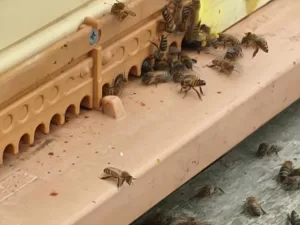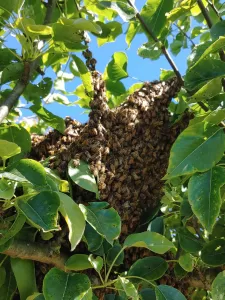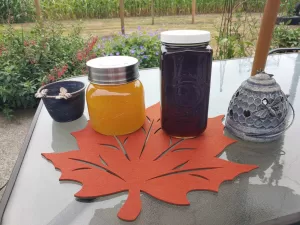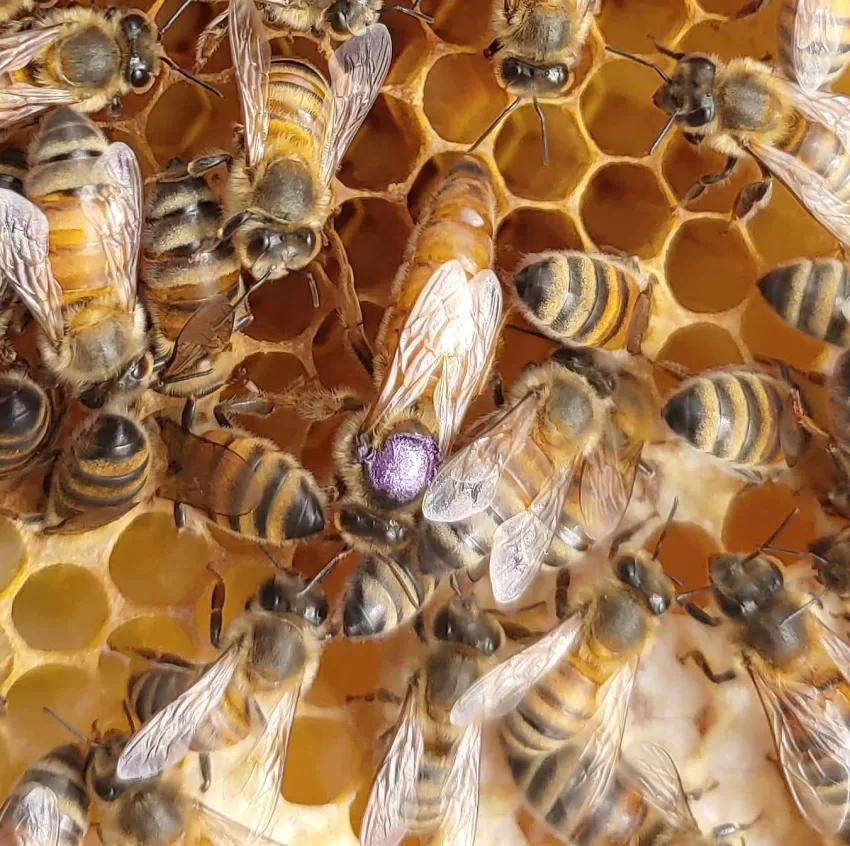By Robin Swain
Photos courtesy of Jill Williams
What do I know about bees? Well, I know I’m allergic to their sting but more importantly, I love honey! I also know we need them for pollination. That’s it for my knowledge of bees.
Fortunately, I happen to know a local bee keeper. Sure, a lot of us rescue cats and dogs, not Jill Williams and her husband, they rescue swarms.
Jill, I have seen your posts about contacting you and your husband to rescue (retrieve?) swarms.
Q: This brings us to the most basic question, how did you get started?
A: First off, it’s just me. My hubby is a little shy of doing anything other than watching. (From afar). My daughter and her husband got into it with me and they are very active. Including having their two oldest boys help out at ages 5 and 3 right now. Baby will also join in when he gets older, I’d bet. We started out by going to a local beekeepers meeting about 6 years ago, just to see what was involved. All of the people in that club are so helpful and accommodating, so we knew immediately it was something we could do. We love honey and we always have a big garden, so bees fell right in line with being able to have our own pollinators then reaping the benefits by collecting the liquid gold.
Q: How many types of bees are there?
A: In Oregon there are about 500 species of bees.
Q: Specifically, how many types do we have in Tillamook County?
A: I would assume Tillamook County is close to the state average. More specifically though we have four types of managed bees: Honey bees (genus Apis), leafcutting bees (genus Megachile), mason bees (genus Osmia), and alkali bees (genus Nomia). Most bee keepers here manage the honeybee with a few that don’t want the work required for honey processing so just manage the mason bees for pollination. That number is significantly lower though.
Q: Are there specific tools and gear required to do this?
 A: Yes! Hive boxes, deeps for brood and supers for honey production, but there is no right or wrong in how you choose to lay you boxes out. You find what works best for you. Some use queen excludes to make sure she doesn’t lay eggs up top where you want to have only honey, but others don’t find it necessary. You need hive tools for removing and inspecting frames, a smoke pot to calm the bees and a means to monitor virroa mites and at least one of the various treatment for those mites. I also use a protein powder to help boost their immunities against viruses. Bees are so susceptible to everything. That is why the big push for backyard beekeepers. Then you need the means to process the honey. There are several ways to do this, including just scraping the frames completely and squeezing it out, but those empty frames will have to have the comb rebuilt and that takes lots of energy away from the bees. I have a small, three frame extractor I use plus I have some honey boxes from Australia that are built in a certain way that you get the honey out through tubes without disturbing the bees. These also don’t need to have the honey filtered, because no wax is coming out with the pure honey. It has its pros and cons.
A: Yes! Hive boxes, deeps for brood and supers for honey production, but there is no right or wrong in how you choose to lay you boxes out. You find what works best for you. Some use queen excludes to make sure she doesn’t lay eggs up top where you want to have only honey, but others don’t find it necessary. You need hive tools for removing and inspecting frames, a smoke pot to calm the bees and a means to monitor virroa mites and at least one of the various treatment for those mites. I also use a protein powder to help boost their immunities against viruses. Bees are so susceptible to everything. That is why the big push for backyard beekeepers. Then you need the means to process the honey. There are several ways to do this, including just scraping the frames completely and squeezing it out, but those empty frames will have to have the comb rebuilt and that takes lots of energy away from the bees. I have a small, three frame extractor I use plus I have some honey boxes from Australia that are built in a certain way that you get the honey out through tubes without disturbing the bees. These also don’t need to have the honey filtered, because no wax is coming out with the pure honey. It has its pros and cons.
 Q: What do you do with a swarm once you have rescued it?
Q: What do you do with a swarm once you have rescued it?
A: Swarms go directly into a hive and a new place for them is found in your apiary.
Q: Are there good bees and bad bees?
A: Lots of people think wasps and yellow jackets are bees, but they really aren’t. They prey on actual bees and can decimate a hive, as they are meat eaters mainly, even though they will consume honey.
Q: What do you do with swarms that are considered harmful?
A: I’ve known a few beekeepers that have had very aggressive hives and they generally tend to kill them. The Queen is responsible for how the hive behaves so she would most likely keep producing aggressive brood.
Q: Do all bees produce honey and is it all edible?
A: Honeybees are really the only managed bees that produce enough honey to collect. Other bees produce just enough to feed themselves, including bumble bees. There is a yellow jacket in Mexico that produces honey also, but I don’t know much about it.
Q: How do you extract honey from a hive?
A: When you pull the frames for use in the extractor, there is a tool the scrapes just the top callings of wax off. This allows the honey to flow out of the frame without removing all the wax. The extractor is a giant centrifuge and the honey flows to the bottom. You must flip the frames to get it out of both sides. The extractor is stainless steel and has a spout at the bottom. This flows into a bucket that has a double strainer, to get rid of wax and bee body parts. From that bucket, ale with a spout at the bottom, you fill your jars.
Q: Does honey have to be processed in any way before bottling or canning?
A: No, you want it in its raw form for the best honey. Processed honey looses it antibacterial property’s and would likely destroy the pollen in it. Honey cannot go bad if it’s not exposed to moisture. They have found honey in Egyptian tombs a thousand years old that you could still eat. Raw honey will sugar over time, but that is normal. Slowly heating in it warm water in low heat, as not to cook it, will give it back it’s nice consistency.
Q: I’ve been told to eat local raw honey wherever I am living, as this reduces allergies. Are there any scientific studies that back this? (Besides that it tastes good).
A: That’s a highly debated subject. It would depend on the pollen they are collecting and which pollen you are allergic too. Regardless, raw local honey has many other wonderful properties.
Q: If like me you are allergic to bee stings, what should you avoid planting near doors, patios and walk ways?
A: Most honeybees will not be concerned with stinging you when they are busy going about their work of collecting pollen and nectar. After all, one sting and they die, so it’s only a defense mechanism, usually while protecting the hive from a perceived threat or of you threaten them in some way while they are out and about. Most times they sting when someone steps on them while in the clover in your yard.
Q: To encourage pollination in your vegetable garden, what are good companion plants?
A: I’ve never worried about that, as I’ve found that wherever the blooms in the garden are, you will find bees if they are around. They will travel up to 2 miles looking for a food source if they have to. Flowers are a different topic as some, like Horace are huge attractor and others don’t attract bees at all.
Q: Do bees sleep/hibernate?
A: They don’t actually hibernate, as they need to keep the queen and themselves fed and the hive clean. They do become less active in the winter and only come out if it gets warm enough. They group up around the queen in winter for warmth, but the queen slows down her egg laying during this time. This is to ensure they don’t have too many bees to feed over the dearth of winter. This egg laying process slows late fall and picks back up again in early spring. During the height of summer she will lay up to 3000 eggs per day.
Q: What else would you like us to know about bees?
A: The only male bees in the hive are drones. Their sole purpose is to mate with the queen. Once that has been accomplished on the mating flight, they serve no other purpose. When a new queen is produced, there can only be one queen in the hive, she will leave for a couple of days with the strongest drones for mating. Then you have to hope she makes it back without getting eaten by a bird or other predator. Or, chopped up by a lawn mower. After that, she will not leave the hive again, unless she swarms, taking half the hive with her.
 Q: Do you sell your honey or have a farm stand?
Q: Do you sell your honey or have a farm stand?
A: Only if I get way more than I need. My daughter sells some, also. Last year they sold about 50 pounds at the Fair. The Beekeeper’s have a booth that many members sell from. I also sell it from my grooming shop. It goes fast though. It’s very hard to keep bees alive through the winter. If you have to buy a new packet of bees, then you are farther behind than if you have a good hive that makes it through the winter. Because my daughter had a website for her Dahlia business, Honeybee Gardens, she sells through there.
I’m greedy I guess. We use so much honey here, I rarely sell it. I like to give it as Christmas gifts. (I hope I’m on Jill’s Honey Christmas list).
Be sure to keep this buzzing in your ear, Buy fresh! Buy local! Support our local farms!
And that’s “The Sweetside About Bees ”…for now.
If you would like more information on bee keeping check out Tillamook Beekeeper’s Association at the link below


